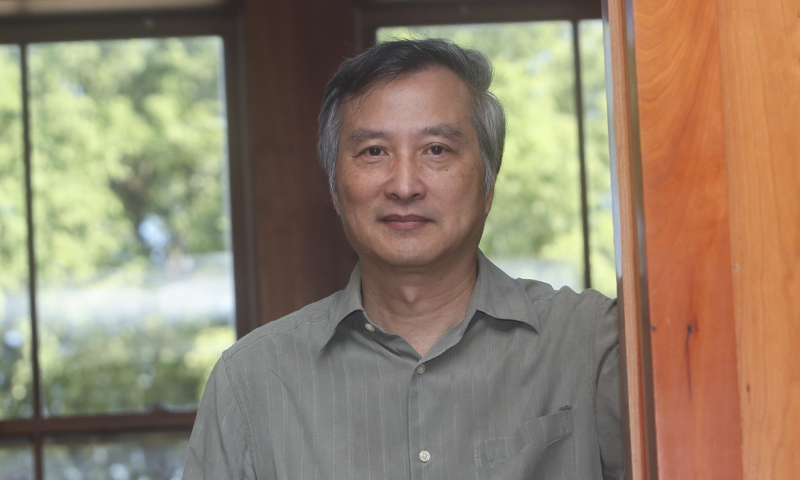
Chi-chiang Huang

Chi-chiang HuangProfessor Emeritus of Asian Studies
Joined faculty in 1987
Ph.D., University of Arizona
M.A., National Taiwan
B.A., National Taiwan
Contact Information
Scholarly Interest
Chinese history and historiography
History of Buddhism in China, Korea, and Japan
Buddhist historiography
Comparative religion and culture
Buddhism and literature
History of Chinese medicine
Science and religion
Teaching Experience
Chinese language at all levels
Modern Chinese Literature in Translation
The Golden Age of Chinese Culture
Buddhism and Taoism through Chinese Literature
Literary and Historical Memory in China
Gods and Ghosts in Chinese Religion (First Year Seminar)
Image of China (First Year Seminar)
Chinese Painting and Poetry (co-taught)
Modern Chinese Art and Literature (co-taught)
Classical Chinese (independent studies)
Classical Chinese poetry (independent studies)
Taoist Tradition in China (independent studies)
Women's Poetry in traditional China (independent studies)
Various other topics in independent studies
Research
Sung Literature Project (Director: Professor Stephen West) University of Arizona
The Ming-Ch'ing Rare Books Project, National Palace Museum, in collaboration with Wei-wen Book Co., Inc. (Project Director: Peter Ch'ang Chief Editor: Wu Che-fu).
Courses Taught
Intermediate Chinese I
Intermediate Chinese II
The Golden Age of Chinese Culture
Buddhism and Taoism through Chinese Literature
Literary and Historical Memory in China
Independent Studies
Publications
Publications after 2000:
Articles:
"Chung-yung in Northern Sung Intellectual Discoursethe Buddhist Components," Classics and Interpretation: The Hermeneutic Traditions in Chinese Culture (New Jersey: Transaction Publishers, RutgersThe State University, 2000), pp. 315-337
"Pure Land Hermeneutics in the Song: the Case of Zhanran Yuanzhao (1048-1116)," Journal of Chung-hwa Institute of Buddhist Studies. Vol 13 (May, 2000) pp. 385-429
"Writing A Comprehensive and Untold History of Buddhism: Some Aspects of Tsu-hsiu's Historiography," Historical Thinking in Sung China (forthcoming, Chinese University of Hong Kong Press, Winter 2002)
"Ŭich'ŏn's Pilgrimage and the Rising Prominence of the Korean Monastery in Hang-chou during the Sung and Yüan Periods," in Currents and Countercurrents: Korea's Influences on the East Asian Buddhist Traditions (Hawai'i: University of Hawaii Press, 2005), chapter 8.
"Sectarianism within Pure Land Hermeneutic Traditionon T'ien-t'ai Exegete's Criticism of Yüan-chao's Subcommentary on the Contemplation Sutra," Journal of Chung-hwa Institute of Buddhist Studies. Vol. 14 (September, 2001), pp. 309-352
"Research Methods and the Construction of the Database for the Online Research on the History of Chinese Buddhism" Contemporary Buddhism. Vol. 12 (Taipei: Huafan University, Spring 2002), pp. 63-76
"Religious Rationality and Rationalization of Religion: Buddhist Causation Theory and Its Meaning in Contemporary Chinese Society" in The Intellectual Tradition of Reason, Scholarship, and Morality, (Taipei: the Himalaya Foundations series titled New Meanings of Chinese Civilization in the 21st Century, April 2004), pp. 477-524. This article is published in three different versions: traditional Chinese characters, simplified Chinese characters, and English. The Chinese language versions are being circulated now. The English version is under way.
"Ŭich'ŏn," "Siksananda," and "dharmadhatu," in Robert Buswell et al., eds. Encyclopedia of Buddhism (New York: Macmillan Reference USA, 2003)
"The Sinification of Buddhist Causation Theory," Journal of Chung-hwa Institute of Buddhist Studies. Vol. 16 (July 2003), pp.233-261.
"Yang Chieh as a Lay Buddhist in the Northern Sunga Supplement to Yang Chieh's Biography in the Sung History." Journal of Chinese Studies, Vol. 21, no. 1 (June 2003), pp.253-277.
"Revisiting the Legend of Sengqie, the Great Sage of Sizhou-Lay Buddhists and the Cult of Sengqie during the Song Dynasty," Journal of the Center for Buddhist Studies, No. 9 (June 2004), pp. 177-220.
"Zhao Mengfu: Copier of Sutras and Patron of Buddhism Including a Special Reference to Qiu Ying's Painting, titled "Zhao Mengfu Writing the Heart Sutra in Exchange for Tea," Jiuzhou Xuelin (Chinese Culture Quarterly), 2: 4 (October 2004), pp. 2-65.
“Searching for Inspiring Masters: Japanese Pilgrims and Buddhist Monasteries in the Jiang-Zhe Region during the Southern Song Dynasty.” Journal of the Center for Buddhist Studies, No. 10 (July 2005), pp. 185-234.
“On Song Literati’s Hand-Copied Sutras, part I.” Jiuzhou Xuelin (Chinese Culture Quarterly), 4: 4 (Winter 2006), pp. 60-102.
“On Song Literati’s Hand-Copied Sutras, part II.” Jiuzhou Xuelin (Chinese Culture Quarterly), 5:1 (Spring 2007), pp. 36-83.
“Rethinking Women’s Piety towards Buddhism: the Case of Song Elite Families, Part I.” Dharma Drum Journal of Buddhist Studies, 2 (June, 2008), pp. 163-246.
“Rethinking Women’s Piety towards Buddhism: the Case of Song Elite Families, Part II.” Dharma Drum Journal of Buddhist Studies, 3 (December, 2008), pp.233-279.
“The Southern Song Calligrapher Zhang Jizhi (1186-1266) and His Association with Buddhist Monks.” Journal of Chinese Studies (December, 2008), pp. 133-166.
“The Interaction between Southern Song Poet-Monks and Literati—Revisit the Zhongxing Chan-lin feng-yue ji.” Chinese Culture Quarterly, vol. 6:3 (Fall 2008), pp.53-120.
“Chijue Daochong and Chan Culture in the Southern Song.” Chinese Culture Quarterly (Summer 2010), pp.128-154.
“The Poem ‘Pine Minister Served as A Ridgepole’—On Its Authorship and Shi Miyuan’s Pine-Felling Myth.” Chinese Culture Quarterly (Forthcoming)
Book Chapters:
“Between This-Worldly Salvation and Self-Confession to Bring Redemption: Southern Song Chan Monk Wuwen Daocan (1213-1271) and His Sense of Filial Duty,” in Fall, Penitence, and Salvation: A Collection of Essays on Confession in Chinese Culture (Taipei: Academia Sinica Press, May, 2013) pp. 295-349.
“The Historical Significance of Southern Song Chan Literature,” in East Asian Studies of Sinitic Language Literature (Shanghai: Shanghai Guji Publishing Inc. Feb., 2013).pp.37-72.
“Ŭich’ŏn’s Pilgrimage and the Rising Prominence of the Korean Monastery in Hang-chou during the Sung and Yüan Periods,” in Currents and Countercurrents: Korea’s Influences on the East Asian Buddhist Traditions (University of Hawaii Press, May 2005), chapter 8.
“Religious Rationality and Rationalization of Religion: Buddhist Causation Theory and Its Meaning in Contemporary Chinese Society.” in The Intellectual Tradition of Reason, Scholarship, and Morality, (Taipei: the Himalaya Foundations series entitled New Meanings of Chinese Civilization in the 21st Century, April 2004), pp. 477-524.
“Writing a Comprehensive and Untold History of Buddhism—Some Aspects of Tsu-hsiu’s Historiography,” in The New and the Multiple: Sung Senses of the Past (Chinese University of Hong Kong Press, January 2004), chapter 12, pp. 371-413.
“Chung-yung in Northern Sung Intellectual Discourse--the Buddhist Components,” in Classics and Interpretation: The Hermeneutic Traditions in Chinese Culture (New Jersey: Transaction Publishers, Rutgers--The State University, 2000), pp. 315-337.
“Ǔich’on,” “Siksananda,” and “dharmadhatu,” in Encyclopedia of Buddhism (New York: McMillan, 2003)
Books:
"Causality, Pure Land, and Rebirth in the Land of Utmost Bliss: Perspectives on the History of Chinese Buddhism" (Taipei: Taiwan Student Book Inc., May 2004), viii+266 pages.
The Great Sage Sizhou and the Pine-Snow Man of the Way---a Study of Elite’s Piety towards Buddhism and Buddhist Culture during the Song-Yuan Period (Taipei: Taiwan Student Book Inc., March, 2009), VII+iii+496 pages.
The “Single-Flavor Chan” and the “River-and-Lake” Poems---Literary Monks and the Change of Chan/Zen Culture in the Southern Song, (Taipei: Commercial Press, June, 2010), vi+12+697 pages.
The “Seal without Letters” Myth and the Decoding of Wuwen Daocan’s Literary Text (Taipei: Commercial Press, October, 2010), viii+336 pages
The Literary Monk Cangsou Shanzhen and Chan/Zen Culture in the Final Decades of the Southern Song---An Analytical and Critical Study of the “Cangsou Zhaigao,” with the Annotation and Punctuation Provided for the Text (Taipei: Xinwenfeng Books, Inc. August, 2010), iii+12+272 pages.
Leaning on the Sunny Window and Laughing at This Life of Mine: Southern Song Chan Monk Huaihai Yuanzhao’s World of Poetry-Chan. Commercial Press, Taipei, Taiwan. May, 2013), vi+9+676 pages.
The Chronological Account of Six Literary Chan Monks in the Southern Song, (Taipei: Student Books Inc. March, 2014) iii+1+437 pages.
PROFESSIONAL AFFILIATIONS
Member of the External Review Committee, Institute of Philology and History, Academia Sinica
Reader, Journal of the Center for Buddhist Studies, Taipei, Taiwan
Member, Editorial Board, the Chung-hwa Institute of Buddhist Studies, Taipei, Taiwan
Honorary Research Fellow, Institute for the Studies of T'ang Culture, Xibei University, Shanxi, PRC
Associate-in-Research, East Asia Program, Cornell University
Association for Asian Studies
T'ang Studies Society (USA)
T'ang Studies Society (ROC)
Sung-Yüan Studies Society
PERSONAL STATEMENT
Born in a middle-class Chinese family and raised by a very stern father who was a loyal student of Confucianism, I was trained to read classical Chinese when I was a youngster. In high school and college, I developed interests in reading classical literary and historical texts and in writing stories, free verses, and essays. This interest was to determine the future of my life.
After receiving a M.A. degree from the Institute for Research in History at National Taiwan University and a two-year preparation, I came to the United States to pursue my doctorate. I soon delved into scholarly works on Tang and Song histories and found modern Chinese historical writings biased and incomplete.
As I indicated in a recent shi style poem written to celebrate my new book, I wanted to emulate the two great Chinese historians, both of whom were surnamed Sima, but I ended up reading Buddhist "lamp history" most of the time in my life and became a specialist in the history of Song Buddhism. An area that had never received attention by Chinese and Western scholars before I tried to tap it, the history of Song Buddhism has since emerged as a noticeable field of Chinese studies. Many years have passed and the field has grown substantially, but I am still not a historian that I expected to be.
Fortunately, I have been able to teach the two Simas' works at HWS, which always reminded me to widen my horizons, broadening my knowledge. In the past few years, I had opportunities to travel to China, Hong Kong, Taiwan, and Japan a number of times. I came to realize the many benefits and rewards of "reading ten thousand volumes of books and walking ten thousand miles of roads," which was an ancient Chinese scholars’ adage.
I have since been in full conviction that thinking globally and seeing things in perspectives are what I want my students to learn when they come to my classes.
